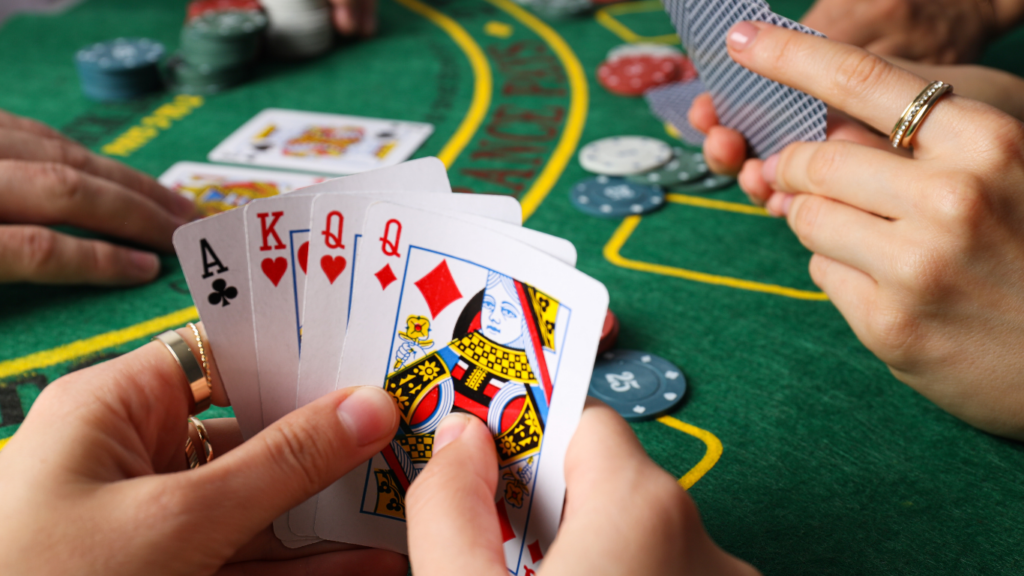What Is Skill-Based Gambling?
Skill-based gambling involves games where a player’s decisions and abilities significantly impact the outcome, rather than relying solely on luck. Unlike traditional casino games like slots or roulette, these games require players to utilize strategy, precision, or knowledge to succeed.
Popular examples include poker, where decision-making and bluffing play crucial roles, and blackjack, which involves strategy in card management. Other genres extend to arcade-style games, such as shooting or racing competitions, offering a gaming experience with real wagering opportunities.
Skill-based gambling blends elements of traditional gaming with monetary stakes, making the experience more interactive. This model shifts the focus toward player engagement while creating avenues for competitive play. It’s gaining attention in modern casinos and online platforms as players seek experiences where effort influences results.
How Skill-Based Gambling Works
Skill-based gambling integrates player performance into determining outcomes, shifting reliance from pure randomness to individual ability. These games reward strategy, practice, and quick thinking more than traditional chance-based gambling.
Difference Between Skill-Based and Chance-Based Gambling
Skill-based gambling emphasizes player decisions and expertise to influence results, while chance-based gambling depends on random events. In skill-based games, players control factors that impact success, such as timing and strategy. For example, poker relies on card reading, bluffing, and decision-making, whereas slot machines rely solely on random number generators. This distinction makes skill-based gambling more interactive and rewarding for those improving over time.
Examples of Skill-Based Games
- Skill-based games span various formats, blending traditional and modern gaming elements.
- Poker challenges players to outthink opponents, using knowledge of statistics and strategic bets.
- Blackjack involves card management and probability-based decisions to succeed against the dealer.
- Arcade-style games, including racing or shooting competitions, add a layer of dexterity and hand-eye coordination to gambling.
- Even digital trivia or puzzle games incorporate mental skills, offering diverse and engaging options for players of all preferences.
Benefits of Skill-Based Gambling

Skill-based gambling presents unique advantages by emphasizing strategy and player ability, offering a more dynamic and rewarding experience compared to chance-based games. Here’s why it stands out:
Opportunities for Skillful Players
Skill-focused gameplay rewards players who excel in specific strategies or abilities. Games like poker allow tactical decision-making, while arcade-style games highlight precision and timing. These opportunities create a level playing field where practice and expertise can lead to better outcomes. Players who invest time honing their skills gain a competitive edge, distinguishing skill-based gambling as an arena for continuous improvement and growth.
Enhanced Player Engagement
Interactive elements in skill-based games increase engagement by giving players more control over results. Unlike traditional casino games driven by luck, these games encourage active thinking and adaptability. For example, blackjack requires probability calculations, and trivia games demand quick recall of information. This active involvement keeps players immersed, transforming the gambling experience from passive to participatory.
Legal Considerations and Regulations
Skill-based gambling operates within a legal framework influenced by regional laws and industry standards. Understanding these factors helps ensure compliance and promotes a fair gaming environment.
Varying Laws by Region
Legal regulations for skill-based gambling differ significantly across countries and states. In the US, states like Nevada and New Jersey explicitly regulate this sector, classifying games based on the balance of skill and chance involved. Some jurisdictions treat these games like:
- traditional gambling activities
- requiring licensing
- oversight
while others exempt skill-dominant games from stringent gambling laws. Internationally, regulations also vary widely. For instance, the UK Gambling Commission applies specific requirements to skill-based gaming operators, ensuring fair gameplay and transparency. However, in regions with less defined rules, operators may face legal ambiguities. Evaluating regional legal frameworks ensures compliance and enhances industry credibility.
Establishing Fair Play Standards
Fair play standards safeguard the integrity of skill-based gambling and build player trust. Licensing authorities mandate guidelines ensuring games operate transparently and outcomes are determined by skill, not hidden algorithms. Certification of Random Number Generators (RNGs) and audits of game mechanics minimize risks of manipulation.
Operators often implement features like skill-matching algorithms to create competitive balance. For example, regulating matchmaking ensures experienced players compete against equally skilled opponents, fostering fairness. Clear disclosure of rules, payout structures, and skill-determining factors also enhances trust among participants.
Tips for Beginners in Skill-Based Gambling
Getting started with skill-based gambling requires thoughtful preparation and attention to key strategies. Focusing on game selection and continuous improvement can enhance success rates.
Choosing the Right Games
Selecting optimal games greatly impacts the gambling experience. I focus on games that match my existing skills or align with interests. For example, poker tests decision-making and bluffing abilities, while trivia games leverage knowledge. It’s essential to review game rules, payout structures, and the balance of skill vs. chance to avoid unnecessary losses. Popular games like blackjack or arcade-based challenges can also provide engaging entry points.
Practicing and Improving Skills
Consistent practice refines abilities and boosts confidence. I often start with free or lower-stakes versions of games, such as demo poker sessions or beginner-friendly blackjack tables, to minimize financial risk while learning. Watching tutorials, studying strategies, and tracking performance over time also help identify and tackle weaknesses. Regularly challenging myself with more competitive matches maximizes growth potential.



 Veronique Godinezie – Entertainment & Gambling Trends Writer
Veronique Godinezie is an expert in the ever-evolving relationship between gambling and entertainment, serving as a Gambling Trends Writer at Gamble Wise Roll. With a keen interest in how gaming intersects with pop culture, esports, and digital innovation, she explores the latest trends that are redefining the gambling experience. From interactive betting experiences and skill-based gambling to the rise of virtual casinos and celebrity-endorsed gaming platforms, Veronique provides engaging and forward-thinking content that keeps readers informed about the future of gambling. Her storytelling brings an exciting and dynamic perspective to Gamble Wise Roll, offering insights into how the industry continues to evolve in the digital age.
Veronique Godinezie – Entertainment & Gambling Trends Writer
Veronique Godinezie is an expert in the ever-evolving relationship between gambling and entertainment, serving as a Gambling Trends Writer at Gamble Wise Roll. With a keen interest in how gaming intersects with pop culture, esports, and digital innovation, she explores the latest trends that are redefining the gambling experience. From interactive betting experiences and skill-based gambling to the rise of virtual casinos and celebrity-endorsed gaming platforms, Veronique provides engaging and forward-thinking content that keeps readers informed about the future of gambling. Her storytelling brings an exciting and dynamic perspective to Gamble Wise Roll, offering insights into how the industry continues to evolve in the digital age.
